News
2020 Tech Salary Study Pegs Cloud Engineer at $128,347
It's good to be a technologist with cloud skills, and even better to have data-wrangling cloud skills.
The 2020 Tech Salary Report from careers firm Dice pegs the occupation of cloud engineer as No. 3 on the list of average tech salaries by occupation, at $128,347. The only occupations above cloud engineer -- systems architect and data architect -- surely do much of their work in the cloud, also.
"Which occupations saw the biggest increases in salary and job postings between 2018 and 2019?" the report says. "The short answer: Those that allowed businesses to wrangle and analyze data, build applications, and make sure those applications went into the world relatively bug-free."
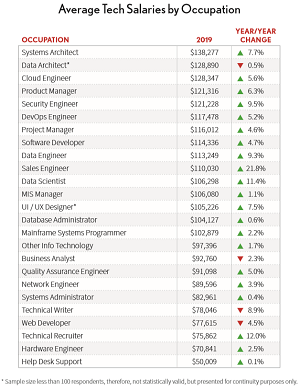 [Click on image for larger view.] Average Tech Salaries by Occupation (source: Dice).
[Click on image for larger view.] Average Tech Salaries by Occupation (source: Dice).
The report is based on Dice's internal data from more than 12,000 technologists, providing insights such as:
- Salary trends by role, skill, city and more.
- How employers can increase job satisfaction with perks beyond salary.
- Which technologists will be looking for new employers in 2020, and how to best attract them.
In addition to listing salaries by occupation, Dice also listed highest average tech salaries by skills, a list dotted by data-related expertise -- especially Big Data -- with Apache Kafka, HANA, Cloudera, MapReduce and Cassandra in the top five.
"When it comes to skills and pay, it all comes down to that most basic of laws: supply and demand. With some older skills, the number of proficient technologists is relatively low, so employers end up paying a lot more to secure their services (this is a key reason why people who know their way around an ancient mainframe, for example, can earn very significant amounts of money; there's only a small number of active professionals with a grasp of decades-old hardware and operating systems)," Dice said.
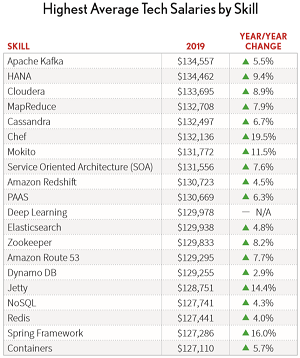 [Click on image for larger view.] Average Tech Salaries by Skill (source: Dice).
[Click on image for larger view.] Average Tech Salaries by Skill (source: Dice).
"With 'hot' skills such as deep learning (a key method for machine learning), the same theme applies: A small but growing number of technologists have mastered these new technologies, and can extract high salaries from hungry employers. And sometimes, there are situations where a large number of technologists have mastered a particular skill, but the market for that skill is still so-white hot that salaries have kept rising; just look at how compensation for Swift, which is used to build apps for Apple's software ecosystem, has continued to rise despite a healthy pipeline of technologists who've mastered it."
Average annual technology industry pay was about $94,000 in 2019, which amounts to a 1.3 percent increase from 2018, a modest increase belied by much larger salary hikes in some "emerging technology hubs" across the country.
Dice followed up on its big salary report earlier this month with The Dice 2020 Tech Job Report focusing on "demand for data-oriented technologists" and those emerging tech hubs.
That report lists fastest-growing occupations, topped by data engineer.
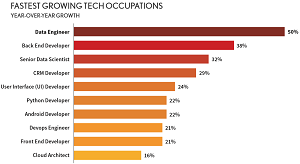 [Click on image for larger view.] Fastest-Growing Tech Occupations (source: Dice).
[Click on image for larger view.] Fastest-Growing Tech Occupations (source: Dice).
It also lists fastest-growing tech skills, headed by Kubernetes.
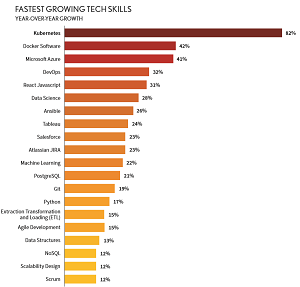 [Click on image for larger view.] Fastest-Growing Tech Skills (source: Dice).
[Click on image for larger view.] Fastest-Growing Tech Skills (source: Dice).
"Over the past few years, it's been all about containerization," Dice said in its February report. "These 'containers,' or isolated user-space instances, allow everyone from developers to system administrators to test and deploy applications without worrying that a crash or a bad bit of code will take down an entire system. Kubernetes is an open-source platform that automates the management and deployment (as well as scaling) of containers, originally designed by Google but now (thanks to its open-source nature) adapted by any number of companies for very specific use-cases. Docker is a particularly popular tool for container management."
The prominence of cloud- and data-related skills and occupations in the report mirrors other recent industry studies.
For example, careers firm Indeed last month reported that "cloud computing and containerization skills are booming."
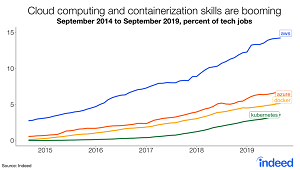 [Click on image for larger view.] Skills Boom (source: Indeed).
[Click on image for larger view.] Skills Boom (source: Indeed).
"Docker, Kubertnetes, and other containerized tech tools allow software engineers to isolate the environment in which an application runs, permitting rapid scalability as user traffic grows," Indeed said. "Employers increasingly demand these skills."
Also last month, TECHnalysis Research reported on cloud computing, finding that workloads vary by platform -- Amazon Web Services, Azure, Google Cloud Platform -- but data rules across all three.
 [Click on image for larger view.] Top Cloud Workloads (source: TECHnalysis Research).
[Click on image for larger view.] Top Cloud Workloads (source: TECHnalysis Research).
Yet another January post by Indeed explored job trends in the cloud computing industry, finding growth in both the supply and demand sides of the market, but with some interesting changes lately, such as Microsoft's Azure cloud platform making inroads against competitors AWS and GCP in terms of job availability and interest.
The January post by Dice sums up the situation with some advice for organizations looking for talent: "With the tech industry's unemployment rate at historic lows, and many technologists expressing satisfaction with their current job, employers today will need to take a holistic approach to recruiting. In addition to compensation and 'traditional' benefits such as healthcare and 401(k) match, employers should also consider that technologists are increasingly interested in emerging benefits such as college tuition reimbursement. With all that in mind, 2020 is the year for businesses to meet their recruiting goals by understanding and acting on the salaries and benefits that technologists value."
About the Author
David Ramel is an editor and writer at Converge 360.